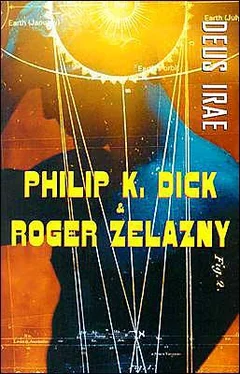“I don’t want to see a reading on a dial,” he answered. “It’s not a record I want; it’s an—” He gestured. “An experience.”
Lurine sighed. “Let it come to you, then. Sit and wait.”
“I can’t wait,” he said. “Because it won’t come this side of the grave.” That enemy which the New Church, the SOWs, craved: their solution. Although at the same time the SOWers liked to think of themselves, the survivors of the war, as the Chosen, the elite whom the God of Wrath had spared.
He saw in their logic the basic fault. If the God of Wrath was evil, as the SOWers maintained, he would spare not the good but the most evil. Hence, by their own logic, they were the wicked of the world; like Carleton Lufteufel himself, they were alive because they were too wicked to be offered the healing balm of death.
Such lunatic logic bored him. So he turned back to the display of pills on the table before him, in his little living room.
“Okay,” Lurine said. “What is there that you’re seeking? You must have some idea, at least as to its worth… or you wouldn’t be always buying those little placebos for all that silver the peddlers charge. I’m very unhappy; maybe tonight I’ll join you.” Today she had told Father Handy that she intended to join the Christian Church, but she had not told either Pete Sands or Dr. Abernathy. As usual, she was having it both ways… an instinct kept her from making the terminal move.
Pete, his forehead wrinkling, said slowly, “I saw once what’s called der Todesstachel. At least that’s what your buddy Father Handy and that inc Tibor would call it; they like those German theological terms.”
“What’s ein Todesstachel?” she asked. She had never heard the word before, but she knew that Tod meant death.
Pete said somberly, “The sting of death. But listen. ‘Sting,’ as when a bug or a nettle stings you… that’s the modern usage. It now means being touched by a poison-filled stinger, as with a bee. But it didn’t always mean that. In the old days, as for example when the King James scholars wrote the phrase ‘Death, where is thy sting?’ they meant it in the old sense. Which is—” He hesitated. “Like being stung by a remark. Do you get it? Stung, for instance, into rage, hurt by a remark. It meant to be pierced by a dartlike point. In dueling, for instance, they stung each other; we would say ‘pricked,’ now. So Paul didn’t mean that death stung the way a scorpion stings, with a tail and a sac of poison, an irritant; he meant a piercing.” Paul had meant what he himself, Pete Sands, had once, under the influence of drugs, experienced.
He had been fighting; the drugs had set off a polymorphic, circus-movement destructiveness and he had strode about smashing things, and, since it was Lurine’s small apartment, he had smashed her possessions and then, incredibly, had, when she tried to stop him, kicked and hit her. And when he did so, he felt the sting—the sting in its older sense: the deep piercing of his body by a sharp-pointed metal gaff, a barbed spear such as fishermen use to secure heavy fish, once netted.
In all his life he had never experienced anything so real. He had, as the gaff entered his side, doubled up in utter pain, and Lurine, who had been ducking and dodging, had halted at once in concern for him.
The gaff—the metal barbed hook itself—came at the bottom end of a long pole, a spear, which ascended from Earth to heaven, and he had, in that awful instant as he tolled doubled up in agony, glimpsed the Persons at the top end of the spear, those who held the pole that bridged the two worlds. Three figures with warm but impassive eyes. They had not twisted the gaff within him; They had simply held it there until, in his pain, he had begun by slow and gradual degrees to become awake. That was the purpose of this sting: to wake him from his sleep, the sleep of all mankind, from which everyone would one day, in the twinkling of an eye, as Paul had said, be roused. “Behold,” Paul had said, “I tell you a mystery. We shall not all sleep but shall be changed, in the twinkling of an eye.” But oh, the pain. Did it take this much to awaken him? Must everyone suffer like this? Would the gaff pierce him again sometime? He dreaded it, and yet he recognized that the three figures, the Trinity, were right; this had to be done; he had to be roused! And yet—
He now got out a book, opened it, and read aloud to, Lurine, who liked to be read to if it wasn’t too long and declamatory. He read a small, simple poem, without telling her the author.
Mother, I cannot mind my wheel;
My fingers ache, my lips are dry;
Oh! if you felt the pain I feel!
But oh, who ever felt as I!
Closing the book, he asked, “What do you think of that?”
“ ‘Sokay.”
He said, “Sappho. Translated by Landor. Probably from one word, from a ‘fragment.’ But it reminds one of Gretchen am Spinnrade—in the first part of Goethe’s Faust.” And he thought, Meine Ruh ist hin. Mein Herz ist schwer. My peace is gone, my heart is heavy. Amazing, so much alike. Did Goethe know? The Sappho poem was better, being shorter. And it, at least as done by Landor, was in English, and he, unlike the SOWer Father Handy, did not delight in strange tongues; in fact he dreaded them. Too many ter-weps had come for example from Germany; he could not forget that.
“Who was Sappho?” Lurine asked.
Presently he said, “The finest poet the world ever knew. Even in fragments. You can have Pindar; he was third-rate.” Again he inspected the display of pills; what to take, what combination? To strive by means of these to reach that other land which he knew existed, beyond the gate of death perhaps.
“Tell me,” Lurine said, smoking away on her cheap Algerian briar pipe—it was all she had been able to purchase from a peddler; the U.K. rose briars were too dear—and watching him acutely, “What it was like that time you took those methamphetamines and saw the Devil.”
He laughed.
“What’s funny?”
“It sounds like,” he said, “you know. Forked tail, cloven hoof, horns.”
But she was serious. “It wasn’t. Tell me again.”
He did not like to remember his vision of the Antagonist, what Martin Luther had called “our ancient foe on earth.” So he got a glass of water, carefully selected several assorted pills, and swallowed them.
“Horizontal eyes,” Lurine said. “You told me that. And without pupils. Just slots.”
“Yes.” He nodded.
“And he was above the horizon. And unmoving. He’d always been there, you said. Was he blind?”
“No. He perceived me, for instance. In fact all of us, all life. He waits.” They are wrong, the Servants of Wrath, Pete thought; upon death we can be delivered over to the Antagonist: it will—may—not be a release at all, only the start. “You see,” he said, “he was so placed that he viewed straight across the surface of the world, as if the world were flat and his gaze, like a laser beam, traveled on without end, forever. It had no focus point, such as a lens creates.”
“What did you take just now?”
“Narkazine.”
“Nark has to do with sleep. Zine is a stimulant, though. Does it stimulate you to sleep?”
“It dulls the frontal lobe and permits the thalamus free activity. So—” He quickly swallowed two tiny gray pills. “I take these to hold back the thalamus.” Brain metabolism, the vasodilation and constriction, was his hobby; he knew the map of the human brain and what a little-too-slight supply of blood to this or that portion could do—that it could forever turn a kindly, warm, perceptive man into a narrow, rigid, suspicious, brooding quasi-paranoid. So he was so careful; he wanted primarily to affect the hormonal secretions of his adrenal-class glands without too much vasoconstriction. And the amphetamines were vasoconstrictors and hence dangerous; they could permanently damage the personality on a physiological basis.
Читать дальше








